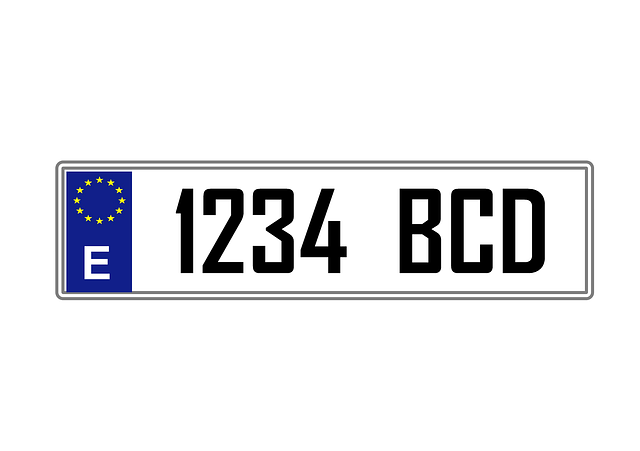When considering the purchase of a used vehicle, discerning its authenticity and legal status is paramount. A meticulous Vehicle Identification Number (VIN) plate inspection serves as a cornerstone in this process, offering a clear window into the car’s history and ensuring it aligns with its purported identity. This article delves into the critical role of VIN plate inspections in safeguarding buyers from falling prey to fraudulent or illegally altered vehicles. It also highlights the importance of VIN decoding for a comprehensive vehicle history report, which is indispensable for informed decision-making. By navigating the intricacies of automotive identity checks and leveraging the expertise of VIN verification agencies, potential buyers can confidently verify their vehicle’s legitimacy and maintain compliance with all legal standards.
- Understanding VIN Plate Tampering and Its Implications for Used Car Buyers
- – Examining the Role of VIN Plates in Automotive Identity Checks
- – Identifying Risks Associated with Tampered VIN Plates
- – How to Spot Signs of VIN Plate Alteration or Tampering
Understanding VIN Plate Tampering and Its Implications for Used Car Buyers

When considering the purchase of a used car, understanding the intricacies of VIN plate tampering is paramount. A vehicle’s VIN plate serves as its unique identifier, encapsulating its history and legal status. Tampering with this plate can signify an attempt to obscure a vehicle’s true origins or conceal any fraudulent activities such as title washing, odometer tampering, or hiding a stolen vehicle. Prospective buyers must engage in a meticulous automotive identity check, which includes inspecting the VIN plate for signs of alteration or replacement. This is crucial because an unscrupulous seller might have replaced the original VIN plate to avoid detection by law enforcement during a VIN check or by a verification agency. Such tampering can render the vehicle’s title transfer requirements invalid and lead to future legal complications.
The implications of VIN plate tampering are far-reaching, potentially affecting the buyer’s safety, the car’s insurance coverage, and its registration status. A tampered VIN plate may indicate that the vehicle has a history of accidents or repairs not disclosed by the seller. It could also mean that the car has a salvage title, which can significantly affect its value and insurability. To mitigate these risks, buyers should always insist on a motor vehicle inspection that includes VIN verification. This process confirms the VIN’s authenticity and ensures it matches the one in the vehicle’s registration documents. By doing so, buyers can make informed decisions, safeguard their investments, and adhere to the stringent requirements set forth by law enforcement and authoritative VIN verification agencies.
– Examining the Role of VIN Plates in Automotive Identity Checks

When purchasing a used car, an Automotive identity check is paramount to ascertain the vehicle’s authenticity and legal standing. Central to this process is the Vehicle Identification Number (VIN) plate, a critical component for verifying a car’s origin and history. A VIN plate tampering incident can compromise the integrity of the vehicle’s record, potentially masking a history of accidents, theft, or fraudulent mileage. Therefore, during a used car inspection, VIN plate verification is not just a formality but a robust measure to safeguard against such discrepancies. A legitimate VIN plate should be securely attached to the vehicle in a visible location, often the dashboard or the driver’s side door frame, making it easily accessible for inspection.
VIN verification agencies play an integral role in this process by providing expertise and resources for thorough checks. These agencies can detect signs of tampering, such as missing digits, altered characters, or mismatched formats, ensuring that the VIN plate has not been compromised. Law enforcement entities also rely on VIN checks to track down stolen vehicles and ensure that title transfer requirements are met. A comprehensive VIN verification not only aids in the legal transfer of ownership but also integrates with motor vehicle inspection protocols to maintain road safety and compliance. Potential buyers can rest assured that by engaging with a VIN verification agency, they are taking a proactive step towards making an informed decision, thereby avoiding the pitfalls associated with unscrupulous sales and ensuring their investment is both legal and secure.
– Identifying Risks Associated with Tampered VIN Plates

When considering the purchase of a used vehicle, identifying risks associated with tampered VIN plates is paramount. Tampering can compromise the integrity of the automotive identity check and lead to a myriad of issues for unsuspecting buyers. A tampered VIN plate can obscure the true history of the vehicle, potentially masking a problematic past such as frequent accidents, outstanding liens, or even theft. This is where a professional VIN verification agency steps in, offering indispensable services to unveil the genuine history behind a car’s VIN. Their expertise ensures that the VIN plate inspection aligns with title transfer requirements and confirms that the vehicle has not been reported stolen or altered in any way. Law enforcement agencies rely on VIN checks as a key tool in their investigations, highlighting the necessity for accurate VIN information to uphold legal standards and protect consumers.
A diligent used car inspection encompasses a motor vehicle inspection that scrutinizes every component of the vehicle’s identity. This includes a thorough examination of the VIN plate to ensure its authenticity and proper placement. A VIN plate replacement, when necessary, is often part of the process to restore the vehicle’s records and legal status. By utilizing a VIN verification agency’s services, buyers gain peace of mind, knowing that they are not inadvertently inheriting someone else’s legal troubles or safety risks. The comprehensive vehicle history report obtained from VIN decoding is an invaluable asset in the car-buying process, providing a transparent account of the vehicle’s past and ensuring that all parties involved are fully informed before any title transfer takes place. This due diligence not only safeguards the buyer’s investment but also contributes to the overall integrity of the second-hand vehicle market.
– How to Spot Signs of VIN Plate Alteration or Tampering

When assessing a used car, an automotive identity check through VIN plate tampering detection is paramount to ascertain its authenticity and legal status. A genuine VIN plate should be affixed in a visible location on the vehicle where it can be easily read, typically on the dashboard for cars, the frame for trucks, or the handle for motorcycles. Signs of VIN plate alteration or tampering may include mismatched rivets or screws used to attach the plate, unconventional materials, or a VIN that does not match the vehicle’s make, model, and year. Potential discrepancies in the VIN between the plate and other areas of the car, such as the chassis, engine block, or vehicle documentation, are also red flags. To conduct a thorough inspection, one should check for proper fastening, ensure the VIN is not obscured or covered by aftermarket parts, and verify that the plate’s font and format comply with the manufacturer’s specifications.
For those seeking to ensure compliance with title transfer requirements, a visit to a VIN verification agency can provide peace of mind. These agencies are equipped to conduct a motor vehicle inspection that includes a detailed VIN check, which law enforcement utilizes to detect criminal activity such as car theft or fraud. By leveraging specialized databases and tools, these agencies can decode the VIN number, revealing the vehicle’s full history, including past accidents, ownership records, and title status. This level of scrutiny is essential for any buyer interested in a transparent used car inspection process, helping to prevent the purchase of vehicles with problematic histories that could potentially lead to costly repairs or legal complications post-purchase. Engaging such services before completing a sale or transfer of ownership is a critical step in the due diligence process for used cars.
In conclusion, the Vehicle Identification Number (VIN) plate plays a pivotal role in safeguarding used car buyers from potential fraud and ensuring vehicles are legally transferred. An Automotive identity check through VIN plate inspection is not merely a formality but a critical step to verify the integrity of a vehicle’s history and its compliance with title transfer requirements. Law enforcement agencies rely on accurate VIN checks for various investigations, underscoring the importance of VIN verification by reputable VIN verification agencies. For prospective buyers, this process is indispensable in making informed decisions during a used car inspection. By choosing to engage with a reliable motor vehicle inspection service for VIN plate assessment or replacement, buyers can confidently invest in their desired vehicle, knowing they are part of a larger effort to uphold legal and safety standards on the road.



